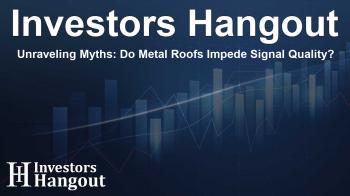Unraveling Myths: Do Metal Roofs Impede Signal Quality?

Understanding Metal Roofs and Signal Interference
Insights from Metal Roofing Alliance (MRA) specialists
Homeowners across various regions are increasingly opting for metal roofs due to their durability and efficiency. Metal roofs are celebrated for lasting over fifty years while providing exceptional resistance to severe weather conditions like hurricanes, hailstorms, and wildfires. These roofs also contribute positively to environmental sustainability.
Despite their numerous advantages, some individuals express concerns that metal roofs may hinder Wi-Fi and cellular signals. This belief often stems from the roofs' impressive protective qualities, which could mistakenly suggest that they interfere with signal strength.
The Reality Behind Signal Interference
According to Renee Ramey, the executive director of the Metal Roofing Alliance, any interference caused by metal roofing is minimal. "Typically, it's other issues causing spotty signals, not the roof itself," Ramey explains.
If metal roofs genuinely disrupted signals, then achieving cell coverage in vehicles would be problematic—a scenario that contradicts the reality that vehicles maintain good connectivity on the go. Understanding the myth surrounding metal roofs' impact on signals requires delving into several factors.
How Metal Reflects Signals
Experts acknowledge that while metal can indeed reflect and absorb radio waves, the overall impact on signal quality is usually slight. Rather than viewing this as a significant drawback, it should be approached as a manageable issue. Today's cellular signals are designed to be robust, incorporating a variety of frequencies and advanced technologies to ensure consistent penetration through different barriers, including numerous construction materials.
Interestingly, the reflective nature of metal roofs can sometimes enhance signal reception within a home. These surfaces can redirect signals from several angles, improving the chances that connectivity will reach devices indoors by bouncing signals into various entryways.
Factors Affecting Wi-Fi and Cellular Signals
When it comes to Wi-Fi connectivity, signal quality and strength depend more on router position, age, and potential obstructions than they do on the materials used in the home. Physical barriers, older routers, and competing electronic devices can all contribute to weak signals.
For cellular service, several factors dictate adequate coverage, including the range of frequency bands utilized by the service provider and the proximity of network towers. Understanding these components is crucial for homeowners experiencing connectivity challenges.
Improving Connectivity at Home
For those whose Wi-Fi services are lacking, several strategies can boost connectivity:
Wi-Fi Enhancements: Repositioning, updating, or even replacing the router can significantly improve signal strength. Implementing an access point device may bridge the gap between the router and devices. Furthermore, adding an exterior antenna can extend the Wi-Fi range. Homeowners should also verify that their wired connection is secure and functioning without interruptions. Options like mesh networks and deactivating unused devices can further enhance capacity.
Cellular Solutions: Consideration of a cell phone signal booster can effectively capture and renew weak outside signals grâce to an external antenna. Femtocells or network extenders can serve a similar purpose by converting broadband internet into cellular signals. In challenging environments, external antennas are invaluable. For homes with a reliable Wi-Fi signal, enabling Wi-Fi calling can significantly elevate call reliability.
The Benefits of Metal Roofing
Homeowners seeking the unique advantages of metal roofing do not need to sacrifice connectivity. According to professionals from the Metal Roofing Alliance, while there can be occasional impacts on signal strength, the benefits of metal roofing consistently outweigh potential issues.
Those intrigued by the modern advantages associated with high-quality metal roofs can obtain more information and guidance by accessing resources provided by organizations like the MRA. For example, be sure to download their comprehensive Metal Roofing Buyer’s Guide for an extensive overview of the benefits of choosing metal roofing.
Frequently Asked Questions
1. Can metal roofs really interfere with cell phone signals?
While metal roofs can reflect and absorb radio waves, their interference with cell signals is minimal and typically manageable.
2. What are some common causes of weak Wi-Fi signals?
Weak signals can result from poor router placement, obstructions, outdated hardware, and interference from competing electronic devices.
3. Are there any solutions for boosting Wi-Fi connectivity?
Solutions include repositioning or upgrading routers, using access points, expanding connections with external antennas, or adopting mesh networks.
4. How can I improve my cellular reception at home?
Employing signal boosters, utilizing femtocells, or establishing external antennas can improve weak cellular signals in homes.
5. What advantages do metal roofs offer besides durability?
Metal roofs provide energy efficiency, aesthetic appeal, and sustainable building options along with superior weather resistance.
About The Author
Contact Dylan Bailey privately here. Or send an email with ATTN: Dylan Bailey as the subject to contact@investorshangout.com.
About Investors Hangout
Investors Hangout is a leading online stock forum for financial discussion and learning, offering a wide range of free tools and resources. It draws in traders of all levels, who exchange market knowledge, investigate trading tactics, and keep an eye on industry developments in real time. Featuring financial articles, stock message boards, quotes, charts, company profiles, and live news updates. Through cooperative learning and a wealth of informational resources, it helps users from novices creating their first portfolios to experts honing their techniques. Join Investors Hangout today: https://investorshangout.com/
The content of this article is based on factual, publicly available information and does not represent legal, financial, or investment advice. Investors Hangout does not offer financial advice, and the author is not a licensed financial advisor. Consult a qualified advisor before making any financial or investment decisions based on this article. This article should not be considered advice to purchase, sell, or hold any securities or other investments. If any of the material provided here is inaccurate, please contact us for corrections.

